Portal:Pan-Africanism/Selected biography
Instructions
The layout design for these subpages is at Portal:Pan-Africanism/Selected biography/Layout.
- Add a new article to the next available subpage.
- The "blurb" for each article should be approximately 10 lines, for appropriate formatting in the portal main page.
- Update "max=" to new total for its {{Random portal component}} on the main page.
Articles list
Selected biography 1
Portal:Pan-Africanism/Selected biography/1
Pan-Africanism/Selected biography | |
|---|---|
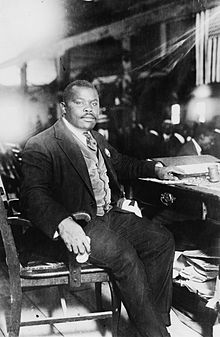 Garvey in 1924 | |
| Born | Marcus Mosiah Garvey Jr. 17 August 1887 |
| Died | 10 June 1940 (aged 52) |
| Occupation(s) | Publisher, journalist |
| Known for | Activism, black nationalism, Pan-Africanism |
| Spouse(s) |
|
| Children | 2 |
| Parent(s) | Marcus Mosiah Garvey Sr. Sarah Anne Richards |
Marcus Mosiah Garvey Jr. ONH (17 August 1887 – 10 June 1940) was a Jamaican-born political leader, publisher, journalist, entrepreneur, and orator. He was President-General of the Universal Negro Improvement Association and African Communities League (UNIA-ACL). He also was President and one of the directors of the Black Star Line, a shipping and passenger line incorporated in Delaware. The Black Star Line went bankrupt and Garvey was imprisoned for mail fraud in the selling of its stock. His movement then rapidly collapsed.
Prior to the 20th century, leaders such as Prince Hall, Martin Delany, Edward Wilmot Blyden, and Henry Highland Garnet advocated the involvement of the African diaspora in African affairs. Garvey was unique in advancing a philosophy to inspire a global mass movement and economic empowerment focusing on Africa known as Garveyism. Garveyism would eventually inspire others, ranging from the Nation of Islam to the Rastafari movement (which proclaim Garvey as a prophet) and the Black Power Movement of the 1960s.
Selected biography 2
Portal:Pan-Africanism/Selected biography/2
Henry Sylvester Williams | |
|---|---|
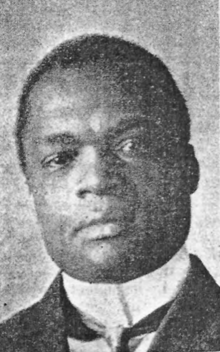 S.Ẃilliams (1905) by E.H. Mills | |
| Born | 15 February 1869 Arouca, Trinidad |
| Died | 26 March 1911 (aged 42) Trinidad |
| Occupation | Barrister |
| Known for | Pan-Africanism |
Henry Sylvester Williams (15 February 1869 – 26 March 1911) was a Trinidadian lawyer, councillor and writer, most noted for his involvement in the Pan-African Movement. As a young man he went to North America to further his education, and subsequently to Britain, where in 1897 he formed the African Association to challenge paternalism, racism and imperialism; the association aimed to "promote and protect the interests of all subjects claiming African descent, wholly or in part, in British colonies and other place, especially Africa, by circulating accurate information on all subjects affecting their rights and privileges as subjects of the British Empire, by direct appeals to the Imperial and local Governments." In 1900 Williams organised the First Pan-African Conference, held at Westminster Town Hall in London. In 1903 he went to practise as a barrister in South Africa, becoming the first black man to be called to the bar in the Cape Colony.
Selected biography 3
Portal:Pan-Africanism/Selected biography/3
Edward Wilmot Blyden | |
|---|---|
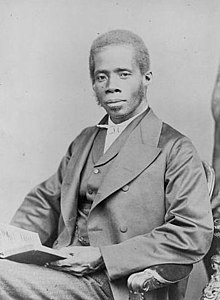 c 1860s, London | |
| Born | 3 August 1832 |
| Died | 7 February 1912 (aged 79) |
| Nationality | Liberian |
| Other names | Eddy, Ed |
| Citizenship | Danish West Indies |
| Occupation(s) | educator, writer, diplomat, politician |
| Known for | "Father of Pan-Africanism" Liberian ambassador and politician |
| Spouse | Sarah Yates |
| Partner | Anna Erskine |
| Children | Pay'ton Blyden |
Edward Wilmot Blyden (3 August 1832 – 7 February 1912) was an educator, writer, diplomat, and politician primarily in Liberia. Born in the West Indies, he joined the free black immigrants from the United States who migrated to the region. He taught for five years in the British West African Colony of Sierra Leone in the early 20th century. His writings on pan-Africanism were influential in both colonies. These were founded during the slavery years for the resettlement of free blacks from Great Britain and the United States.
Blyden's writings attracted attention in the sponsoring countries as well. He believed that Zionism was a model for what he called Ethiopianism, and that African Americans could return to Africa and redeem it. He believed political independence to be a prerequisite for economic independence, and argued that Africans must counter the neo-colonial policies of former colonial powers.
Selected biography 4
Portal:Pan-Africanism/Selected biography/4
Alhaji Alieu Ebrima Cham Joof | |
|---|---|
| Born | Alieu Ebrima Cham Joof 22 October 1924 Bathurst, British Gambia |
| Died | 2 April 2011 (aged 86) Bakau, Gambia |
| Resting place | Juswang cemetery, Gambia |
| Occupation | historian, politician, author, trade unionist, broadcaster, radio programme director, scout master, Pan-Africanist, lecturer, columnist, activist, nationalist |
| Nationality | Gambian |
| Literary movement | history, politics, culture |
| Notable works | The history of the Banjul Mosque Getting to know The Gambia The root cause of the bread and butter demonstration Banjul Daemba 1816-1999 Tagator |
| Parents | Ebrima Joof and Aji Anna Samba |
| Relatives | Alhaji Bai Modi Joof (younger brother), Tamsier Joof (nephew), Pap Cheyassin Secka (nephew) |
Alieu Ebrima Cham Joof (22 October 1924 – 2 April 2011) commonly known as Cham Joof, (pen name: Alh. A.E. Cham Joof) was a Gambian historian, politician, author, trade unionist, broadcaster, radio programme director, scout master, Pan-Africanist, lecturer, columnist, activist and an African nationalist who advocated for the Gambia's independence during the colonial era.
Cham Joof was born on 22 October 1924 at 7 Griffith Street (Half-Die) in Bathurst now Banjul, the capital of the Gambia. He came from a Serer and Wolof background. He was the third child and the eldest son of Ebrima Joof (1887–1949) and Aji Anna Samba (1896 – 9 April 1977). On his father's side (the Joof family), he was a descendant of the Joof Dynasty of Sine and Saloum, and the Njie Dynasty of Jolof. On his mother's side, he was the great grand-nephew of Tafsir Sa Lolly Jabou Samba — a 19th-century Senegambian jihadist, military strategists and advisor to Maba Diakhou Bâ and one of the commanders of his army. Cham Joof was the elder brother of Gambian barrister Alhaji Bai Modi Joof.
Selected biography 5
Portal:Pan-Africanism/Selected biography/5
Aimé Fernand David Césaire | |
|---|---|
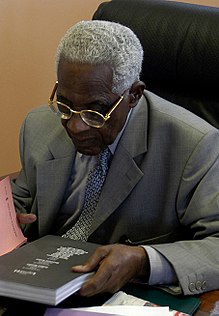 Aimé Césaire in 2003 | |
| Born | Aimé Fernand David Césaire 26 June 1913 |
| Died | 17 April 2008 (aged 94) |
| Alma mater | École Normale Supérieure, University of Paris |
| Known for | Poet, politician |
| Political party | Parti Progressiste Martiniquais |
| Spouse | Suzanne Roussi |
Aimé Fernand David Césaire (/seɪˈzɜːr/; French: [sezɛʁ]; 26 June 1913 – 17 April 2008) was a Francophone and French poet, author and politician from Martinique. He was "one of the founders of the négritude movement in Francophone literature". His works included Une Tempête, a response to Shakespeare's play The Tempest, and Discours sur le colonialisme (Discourse on Colonialism), an essay describing the strife between the colonizers and the colonized. His works have been translated into many languages.
Selected biography 6
Portal:Pan-Africanism/Selected biography/6
Frances Cress Welsing | |
|---|---|
 Welsing receives Community Award at National Black LUV Festival on September 21, 2008 | |
| Born | Frances Luella Cress March 18, 1935 |
| Died | January 2, 2016 (aged 80) Washington, D.C., U.S. |
| Alma mater | Antioch College (B.S.), Howard University (M.D.) |
| Occupation | Physician |
| Known for | The Isis Papers: The Keys to the Colors (1991) |
Frances Cress Welsing (née Cress; March 18, 1935 – January 2, 2016) was an American Afrocentrist and psychiatrist. Her 1970 essay, The Cress Theory of Color-Confrontation and Racism (White Supremacy), offered her interpretation on the origins of what she described as white supremacy culture.
She was the author of The Isis Papers: The Keys to the Colors (1991). Welsing caused controversy after she said that homosexuality among African-Americans was a ploy by white males to decrease the black population.
Selected biography 7
Portal:Pan-Africanism/Selected biography/7
Issa Laye Thiaw | |
|---|---|
| Born | Issa Laye Thiaw 1943 Sangué, (Thies region), in Senegal |
| Died | 10 September 2017 |
| Nationality | Senegalese |
| Occupations | Historian, theologian, author, essayist |
| Known for | Serer religion |
| Notable work | "La femme Seereer", "La religiosité Seereer, avant et pendant leur Islamisation." |
Issa Laye Thiaw (born 1943 at Sangué, Thies region of Senegal, died 10 September 2017, Senegal was a Senegalese historian, theologian, and author on Serer religion, Serer tradition and history.
Selected biography 8
Portal:Pan-Africanism/Selected biography/8
Molefi Kete Asante | |
|---|---|
| Born | Arthur Lee Smith Jr. August 14, 1942 |
| Occupation(s) | Professor Philosopher Author Scholar |
| Spouse | Ana Yenenga |
| Website | http://www.asante.net |
Molefi Kete Asante (/əˈsænteɪ/; born Arthur Lee Smith Jr.; August 14, 1942) is an African-American professor. He is a leading figure in the fields of African-American studies, African studies and communication studies. He is currently professor in the Department of Africology at Temple University, where he founded the PhD program in African-American Studies. He is president of the Molefi Kete Asante Institute for Afrocentric Studies.
Selected biography 9
Portal:Pan-Africanism/Selected biography/9
Winnie Madikizela-Mandela OLS MP (born Nomzamo Winifred Zanyiwe Madikizela; 26 September 1936 also known as Winnie Mandela, was a South African anti-apartheid activist and politician, and the ex-wife of Nelson Mandela. She served as a Member of Parliament from 1994 to 2003, and from 2009 until her death, and was a deputy minister of arts and culture from 1994 to 1996. A member of the African National Congress (ANC) political party, she served on the ANC's National Executive Committee and headed its Women's League. Madikizela-Mandela was known to her supporters as the "Mother of the Nation".Selected biography 10
Portal:Pan-Africanism/Selected biography/10

Aminata Mbengue Ndiaye is a Senegalese politician. In 2012, she was appointed Minister of Livestock and Animal Production in the Mbaye government. She also serves as mayor of Louga, and is currently chair of the women's movement of the Socialist Party of Senegal
Selected biography 11
Portal:Pan-Africanism/Selected biography/11
Toussaint Louverture | |
|---|---|
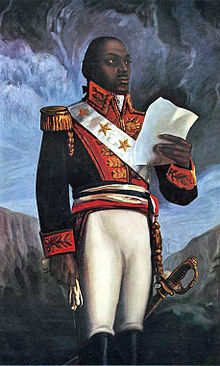 Posthumous painting of Toussaint Louverture | |
| President of Haiti | |
| In office 7 July 1801 – 6 May 1802 | |
| Appointed by | Constitution of 1801 |
| Preceded by | Inaugural holder |
| Succeeded by | Jean-Jacques Dessalines (Republic of Haiti) |
| Governor-General of Saint-Domingue | |
| In office 1797–1801 | |
| Appointed by | Étienne Maynaud |
| Preceded by | Inaugural holder |
| Succeeded by | Position abolished |
| Personal details | |
| Born | Toussaint Bréda 20 May 1743 Saint-Domingue (now Haiti) |
| Died | 7 April 1803 (aged 59) Fort-de-Joux, France |
| Nickname(s) | Napoléon Noir Black Spartacus |
| Military career | |
| Allegiance | |
| Service/ | French Army French Revolutionary Army Armée Indigène |
| Rank | General |
| Battles/wars | Haitian Revolution |
François-Dominique Toussaint Louverture (French: [fʁɑ̃swa dɔminik tusɛ̃ luvɛʁtyʁ] 9 May 1743 – 7 April 1803), also known as Toussaint L'Ouverture or Toussaint Bréda, was the best-known leader of the Haitian Revolution. He was a leader of the growing resistance. His military and political acumen saved the gains of the first Black insurrection in November 1791. He first fought for the Spanish against the French; then for France against Spain and Great Britain; and finally, for Saint-Domingue against Napoleonic France. He then helped transform the insurgency into a revolutionary movement, which by 1800 had turned Saint-Domingue, the most prosperous slave colony of the time, into the first free colonial society to have explicitly rejected race as the basis of social ranking.
Though Louverture did not sever ties with France, his actions in 1800 constituted a de facto autonomous colony. The colony's constitution proclaimed him governor for life even against Napoleon Bonaparte's wishes. He died betrayed before the final and most violent stage of the armed conflict. However, his achievements set the grounds for the Black army's absolute victory and for Jean-Jacques Dessalines to declare the sovereign state of Haiti in January 1804. Louverture's prominent role in the Haitian success over colonialism and slavery had earned him the admiration of friends and detractors alike.
Selected biography 12
Portal:Pan-Africanism/Selected biography/12 Musa Ngum (or Musa Afia Ngum, born 1953 in Fatoto, the Gambia; died 11 October 2015 at the Dantec Hospital, Dakar, Senegal) was a singer and songwriter who was very popular in Senegal and Gambia. He was one of the pioneers of mbalax music, and "helped to define the mbalax style of popular music in the Senegambia" and "had a strong influence on Youssou N'Dour and other mbalax pioneers". He was "something of a cult icon back in the Senegambia region, and a pioneer of the mbalax fusion style". The mbalax, which originated from the Serer religious and ultra–conservative njuup music tradition sang during Ndut rites by circumcised boys (also referred to as “Kassak” songs) was the foundation of Ngum's music career. He mastered many of the njuup classics and built a name for himself whilst at the same time developing his voice.
Throughout his music career, Ngum advocated for Pan-Africanism, and in particular the unification of Senegal and Gambia under one president.

